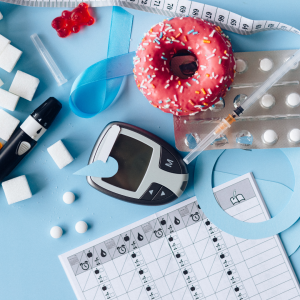HEALTH TOPICS
What is Diabetes?
Posted by: Mariana Rosa
What is Diabetes and What Can Help Manage It?
Diabetes is a disease in which your blood glucose levels are too high.
When you have diabetes, your body either doesn’t make enough insulin, can’t use it as well as it should, or both. Too much glucose stays in your blood and doesn’t reach your cells. Over time, having too much glucose in your blood can cause serious health problems (diabetes complications). So if you have diabetes, it’s important to keep your blood glucose levels within your target range.What are blood glucose targets?
If you have diabetes, your blood glucose target is the range you try to maintain. The typical targets are:
- Before a meal: 80 to 130 mg/dL
- Two hours after the start of a meal: Less than 180 mg/dL
Your blood glucose targets may be different, depending on your age, any additional health problems you have, and other factors. Talk with your health care team about the best target range for you.
Hyperglycemia
It’s important to keep your blood sugar levels in your target range as much as possible to help prevent or delay long-term, serious health problems, such as heart disease, vision loss, and kidney disease.
What else can I do to help manage my blood sugar levels?
 Eating a healthy diet with plenty of fruit and vegetables, maintaining a healthy weight, and getting regular physical activity can all help. Other tips include:
Eating a healthy diet with plenty of fruit and vegetables, maintaining a healthy weight, and getting regular physical activity can all help. Other tips include:
- Keep track of your blood sugar levels to see what makes them go up or down.
- Eat at regular times, and don’t skip meals.
- Choose foods lower in calories, saturated fat, trans fat, sugar, salt and high fibre.
- Track your food, drink, and physical activity.
- Drink water instead of juice or soda.
- Limit alcoholic drinks.
- For a sweet treat, choose fruit.
- Control your food portions (for example, use the plate method: fill half your plate with non-starchy vegetables, a quarter with lean protein, and a quarter with a grain or starchy food).
What else can help with Managing Blood Sugar?
Cinnamon
Several small studies have linked cinnamon to better blood sugar levels. Some of this work shows it may curb blood sugar by lowering insulin resistance. In one study, volunteers ate from 1 to 6 grams of cinnamon for 40 days. (One gram of ground cinnamon is about half a teaspoon.)
Aloe Vera
Aloe vera lowers blood glucose levels in diabetic patients. It also improves the responsiveness of the body tissues to insulin, thereby making insulin more effective. Active components present in Aloe vera also help in lowering high blood pressure.
Vitamin D
Vitamin D is a fat-soluble vitamin that is produced naturally in our bodies in response to direct sunlight. It’s also found in foods and supplements. Interestingly, low vitamin D levels have recently been linked in several studies to an increased risk of type 2 diabetes as well as insulin resistance. Researchers believe this link may be due to vitamin D’s ability to help lower inflammation, as more inflammation means a higher possibility of insulin resistance. Vitamin D + Vitamin K supplements is recommended as Vitamin K helps absorption of Vitamin D.
Magnesium
Magnesium is an essential nutrient for the brain and body. It helps regulate blood sugar, among its many benefits. Yet a magnesium deficiency is often seen in people with diabetes. A deficiency can occur with type 1 and type 2 diabetes, but appears to be more prevalent with type 2.
References:
https://www.mayoclinic.org/diseases-conditions/diabetes/diagnosis-treatment/drc-20371451
https://www.who.int/data/gho/indicator-metadata-registry/imr-details/2380#:~:text=The%20expected%20values%20for%20normal,and%20monitoring%20glycemia%20are%20recommended.
https://medlineplus.gov/bloodglucose.html#:~:text=Blood%20glucose%2C%20or%20blood%20sugar,your%20pancreas%20to%20release%20insulin.
https://my.clevelandclinic.org/health/diseases/9815-hyperglycemia-high-blood-sugar
https://www.forbes.com/health/body/blood-sugar-supplements/#:~:text=Vitamin%20D%20supplementation%20may%20be,Kumar%20and%20Davis.
Subscribe to Gr8Health
Sign up to get 5% off your first order, exclusive access to our special offers, new arrivals and more.